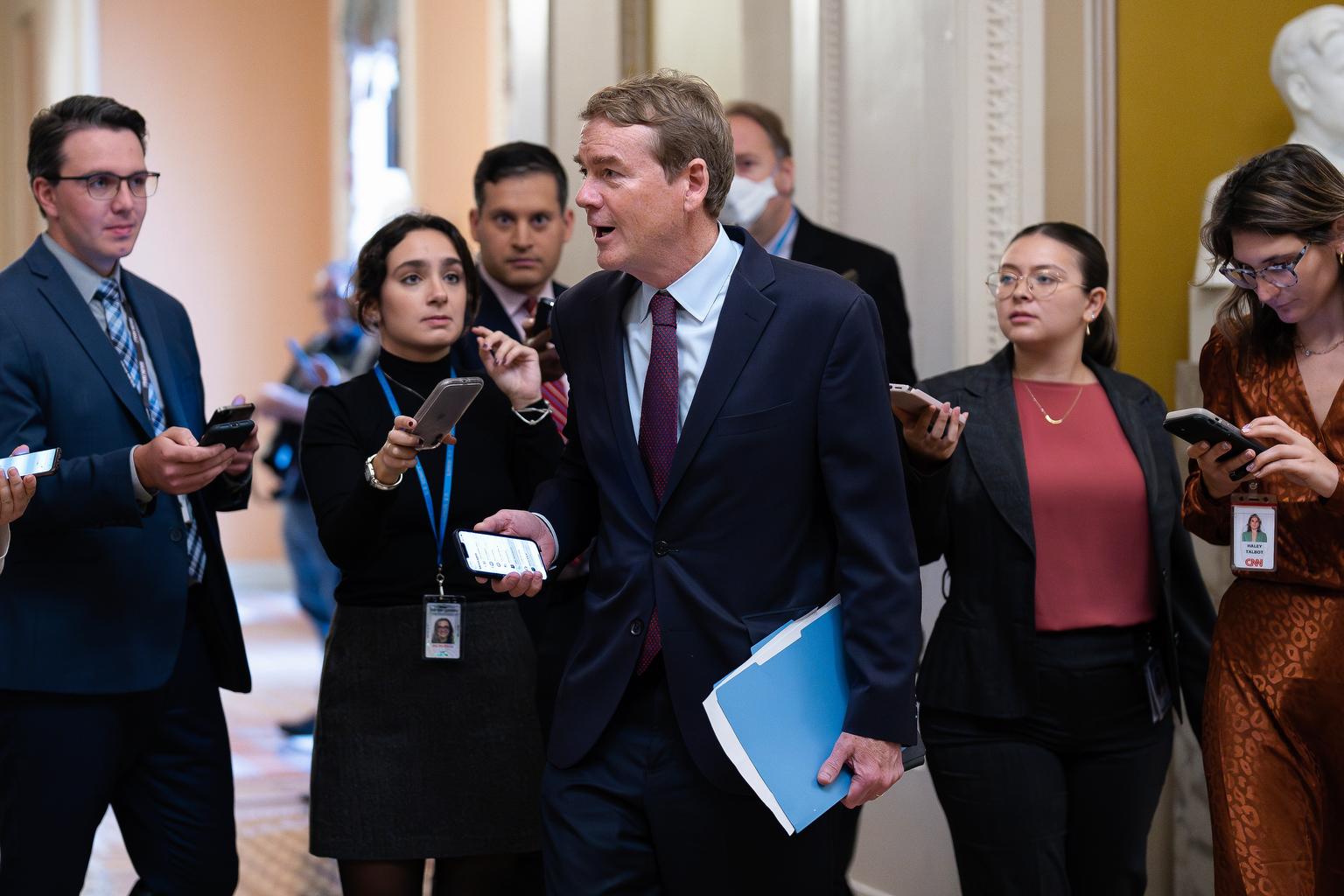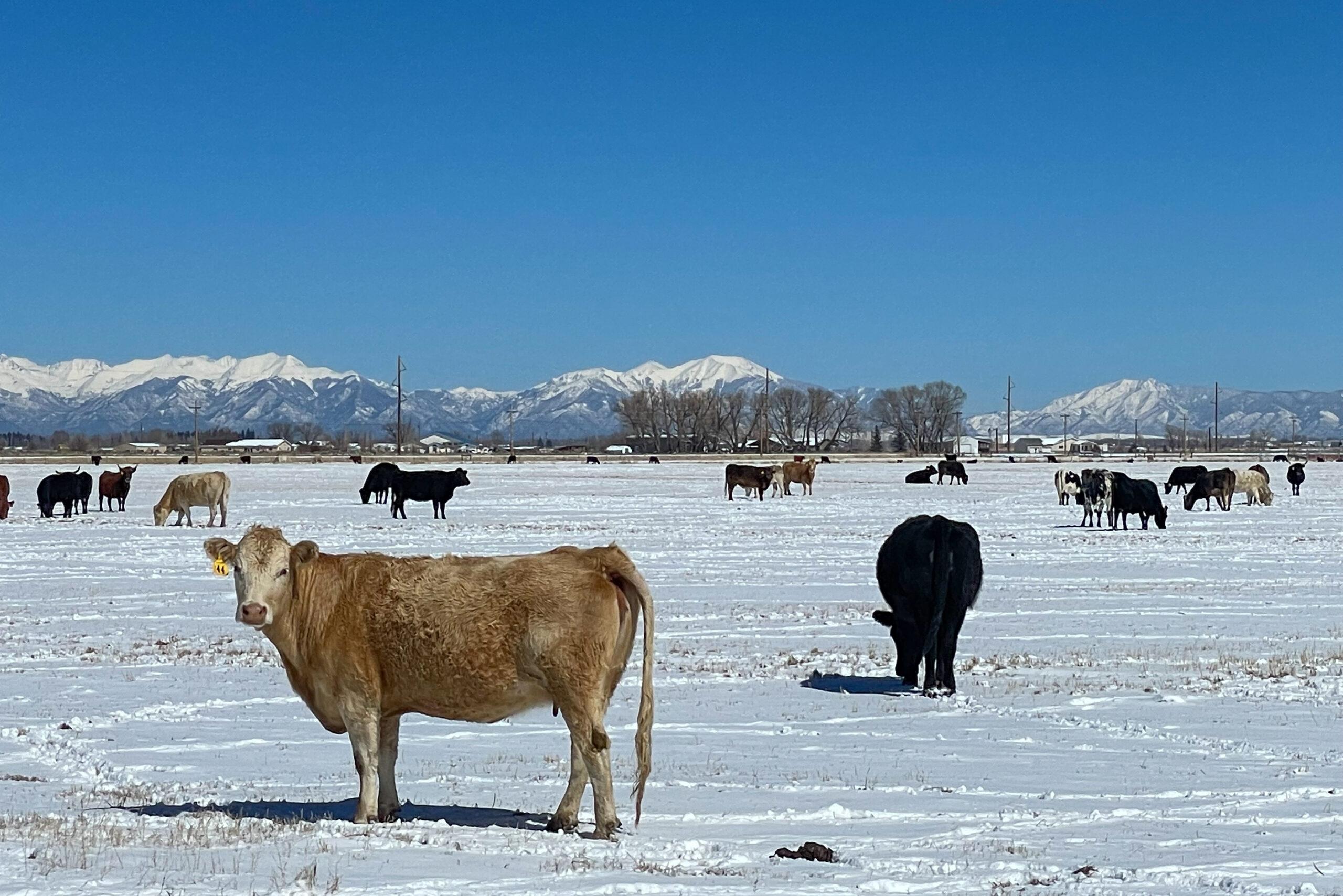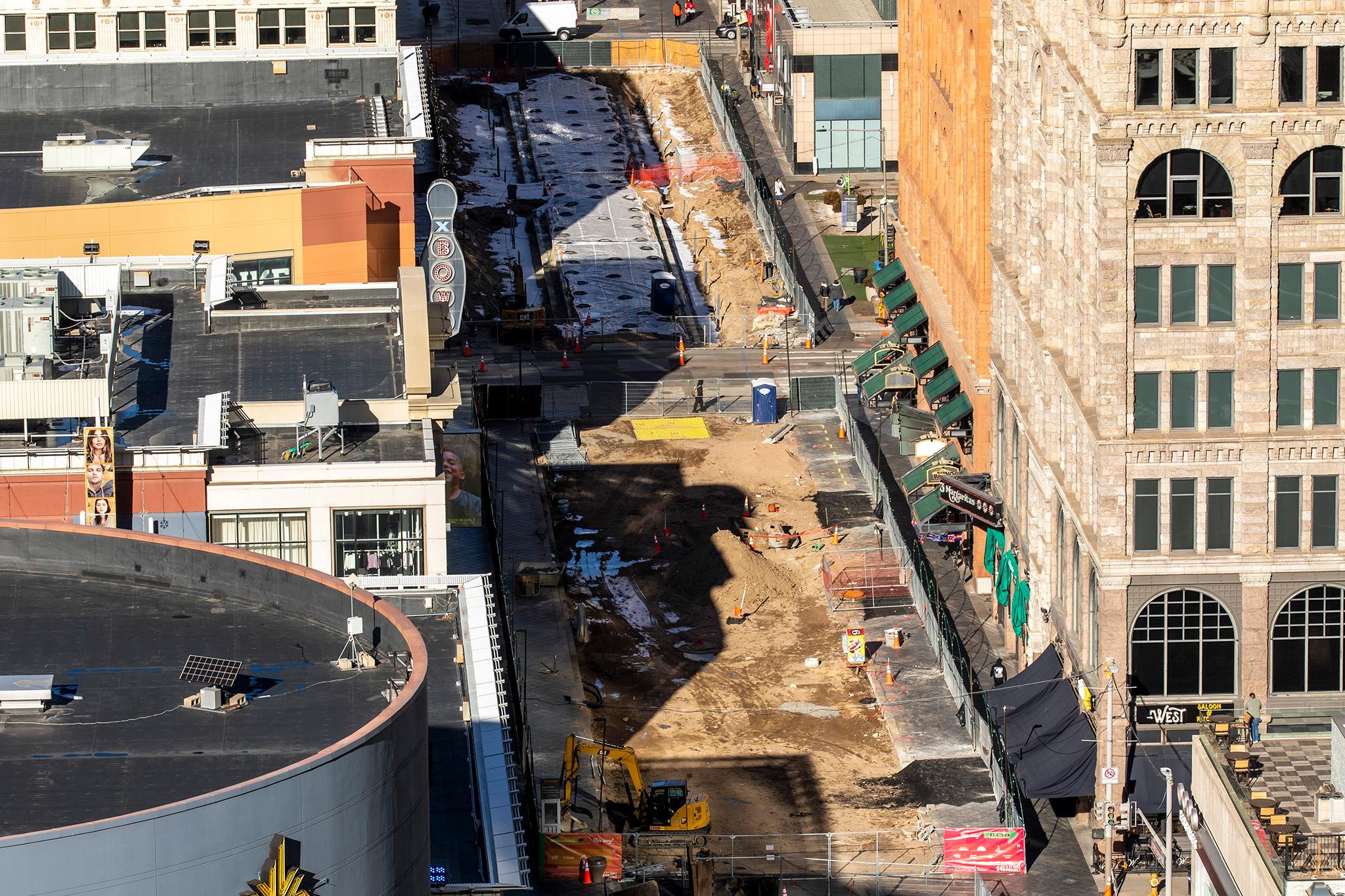
An unusually large number of people trying to immigrate to the U.S. in order to establish new lives has intersected with a national immigration system long in need of updating. Together, it has created a situation that U.S. Sen. Michael Bennet called “chaos” at the southern U.S. border.
In an interview with Colorado Matters, Bennet, a Democrat whose mother is an immigrant from Poland, discussed his attempts to change U.S. immigration laws for more than a decade. He was part of a bipartisan legislative group whose 2013 bill, which passed the Senate and died in the House, would have put more money to enforcement at the border while creating a path to citizenship for 11 million people who have established lives in the U.S. without documentation.
The bill he’s pushing in Congress now is a shadow of that failed bill, and it faces opposition from some Republicans who don’t want to help President Biden with one of his goals in an election year, and from some Democrats who believe the proposals on the table would be inhumane and ineffective.
But Bennet says the current bill is a necessary first step. He hopes the Senate will finalize it this weekend, even though it faces grim prospects in the House.
On the ground in Colorado, people working to assist new immigrants say larger reform is necessary, not just for people now fleeing things like a lack of opportunity and basic human rights in their home countries, but also for the millions of people who have contributed to the U.S. for decades while living in legal limbo.
“This draconian enforcement of the border and throwing more security towards the border – that, from my perspective, has been done and tried for the last 30 years, and we are where we are, right?” said Mateos Alvarez, head of the Aurora Economic Opportunity Coalition and a local leader in scaling up nonprofit aid for new immigrants who can’t get legal authorization to work.
“Giving work opportunities as part of the package would take us way further towards self-reliance, independence, and building up the wealth of this country,” he said.

Marielena Suarez leads Organización Papagayo in Denver, which has helped thousands of new immigrants access housing, mental health services, and more. She wants to see a national response that includes more legal pathways to citizenship and work permits.
“We are welcoming so many families, and we don’t have reforms that can help them sustain themselves. What are we doing? To me, it’s like a ticking time bomb that is about to explode… We cannot allow thousands of people to end up on the streets,” she said.
To that end, Suarez, Alvarez and their nonprofit partners are also asking Congress and the Biden administration for more funds to support cities and organizations dealing with the fallout of the country’s broken immigration system. Bennet is among a group of Colorado Democrats who have asked FEMA to provide more money.
In the Colorado Matters interview, Bennet provided an update on that request, pointed out where he thought the Biden administration was wrong on immigration, and explained why he opposes a liberal idea to get around restrictions on work authorization for people arriving in the country.
This interview transcript has been edited for length and clarity.
Colorado Matters host Ryan Warner: In recent weeks, we've seen reports of a Senate deal brewing that would be tied to Ukraine aid. Is the deal still alive and what would it do on immigration?
Senator Michael Bennet: I would say the deal is still alive. What it would do on immigration is change the asylum standard to raise the threshold at the border, and provide money and resources to the agencies at the border so that determinations could be made more expeditiously about whether people should be released into the United States or not. That's not happening today because the border is overwhelmed at this moment.
The deal is very much in doubt. Republicans are divided in the Senate about whether they want to vote for this deal. Some of them, I suppose, are just opposed to it. Some are worried that they're going to give the president of the United States a political benefit, and the House of Representatives is saying they won't vote for any border bill at all for that reason.
We've been working hard on this for months. Hope springs eternal and I continue to hope we're going to somehow get this done over the weekend.
Warner: You talk about raising the threshold for asylum. Does that mean turning more people away?
Bennet: It would turn more people away. It's important to understand that there are now four to five times the number of people that are coming to the border than were coming to the border in previous presidencies.
That's largely the result of transnational gangs creating billion dollar enterprises to smuggle people from all over the world to the United States, and the system has become completely overwhelmed as a result, as you can see in Denver and in Colorado.
Warner: You say “hope springs eternal” that you’ll pass the current bill being discussed. Is that being Pollyanna?
Bennet: I hope it's not Pollyanna, but the tragedy of the “Gang of 8” bill in 2013 was that it got 68 votes in the Senate, went over to the House and a minority of House members, the so-called Freedom Caucus, wouldn't even allow it to be voted on. Speaker John Boehner said his greatest regret was not bringing that vote to the floor.
That was a much better, more comprehensive and more thoughtful bill than the one that we're considering right now. But I hope this speaker doesn't make the same mistake that John Boehner made.
Warner: The deal you’re talking about would focus mostly on detention and deportation. Is that strategy focused on policing immigrants the only option? Because we hear from people like Yaile Peña, who studied business in Venezuela and immigrated here to establish a career, that they want to work. What about the idea of allowing more people into the U.S. in an orderly way to get work legally, particularly during a labor shortage that’s driving inflation?
Bennet: Work visas are part of this deal – not nearly as many as I would wish, and it does not include visas for people that have been in our country for 10, 15, or 20 years, including Dreamers and people that have picked fruits and vegetables all over the western United States who are saying, ‘Where are we? Why have we been left completely behind in all of this discussion?’
Unfortunately, the Republicans in this negotiation have refused to allow work permits for people that have been here before, and they've been very parsimonious, as I understand it, with the ones that are going to be part of this deal.
What is crazy is that now in the United States we basically have a system of immigration that is so broken that the only way people believe they can migrate here and work is to do it illegally. We should be working on lawful ways for people to come to this country in a thoughtful way that allows people to have the benefit of the promise of the United States, and allows the United States to have the benefit of the promise of immigration.
Regrettably, deeply regrettably, that is not part of the legislation that we're passing today. I hope and I believe that we will ultimately pass something very much like the Gang of 8 bill in 2013, which dealt with all of this. But that's not going to happen today.

Warner: Is it not going to happen today because of the makeup of the Senate and the House?
Bennet: Yes and because the system today is completely overwhelmed. I was one of the few Democrats to object to the Biden administration's lifting of Title 42. I had seen in my work on immigration all these years how important it is to have a plan. They had no plan, and what has happened is what I predicted would happen, which is that the system has become completely overwhelmed.
Now we're dealing with some politicians who are waving a bloody flag of anti-immigrant rhetoric, and I think that is deeply at war with who we are as Americans and deeply at war with the policies that we need to adopt.
We're trying to get to an agreement that, in the moment, makes sense for the American people. In the end, we have to create a system that's consistent with the rule of law and our heritage as a nation of immigrants and our future as a nation of immigrants.
Warner: Very little has changed in the decade-plus that you’ve been involved in negotiations around changes to the immigration system. As you pointed out, some Republicans are betting immigration will be a winning campaign issue for them. They believe that chaos in the system is good, electorally, for them in 2024. Democrats also regularly campaign on immigration. So it’s a campaign issue, but should people have any hope that serious reform could happen when it hasn’t since the 1980s?
Bennet: You said nothing has gotten done. I think the right way to characterize it is that matters have gotten a lot worse, and the utter dysfunction of Washington, D.C., when it comes to immigration policy is reaping a whirlwind today. We have turned the rhetoric of immigration into political napalm in this country.
You can see very clear distinctions in the candidates that are running for president. As the son of an immigrant to this country and as the former superintendent of a school district that was full of immigrants, I feel very, very strongly that a core aspect of who we are as Americans, and in fact one of the great advantages we have over our competitors around the world, is when we've had a functional immigration system.
Warner: We're seeing the Republican governor in Texas push the legal limits of a state's role in immigration and enforcement. Should Democrats be doing anything like that to align with what the Democratic base has said it supports? For example, should Colorado create an easier way for new immigrants to get work permits, as a liberal way of testing what's under a state's jurisdiction?
Bennet: I think that's just more of the same kind of politics that have gotten us into this morass. There is a reason why the Constitution of the United States assigns immigration to the federal government. This is not Jared Polis' job. This is not Mike Johnston's job. These are matters that Congress has to address, not because I've got great faith in Congress, but because if there's one reason I can think of that we'd be one nation under God, it would be to have a rational immigration system. I don't think Democrats playing politics with it is going to make anything better.
Warner: Should Donald Trump’s border wall have been fully built?
Bennet: In the 2013 bill, we had $40 billion for the border. That is a gazillion dollars more than Trump ever spent on his “wall.” But it was not medieval technology; it was technology that would allow us to see every single inch of the border, and allow us to see who is coming across the border. I think that would make a lot more sense than trying to build the wall in places where it makes no sense to build the wall.
Editor’s note: Trump’s administration spent about $15 billion on the border wall.
Warner: You and other Colorado Democrats asked the Biden administration to shuffle its priorities and fund cities and nonprofits helping new immigrants. Have you heard back on your request?
Bennet: We haven't yet. I imagine that everybody is tied up in the negotiations that we're trying to get done this weekend. The money would be to backfill the community groups and local governments that have been having to go out of their own pocket to be able to address the humanitarian issues that have been caused by the broken immigration system that we have.
Warner: Do you think Washington is meeting this moment to confront the massive global migration happening right now?
Bennet: No, I don't think we are, and I would take it one step further: It’s not enough to have a system of lawful immigration where people have the ability to work. I mean, the Gang of 8 bill had a pathway to citizenship for the 11 million people that are here that are undocumented. It had a pathway to citizenship for the Dreamers. It dealt with all the visa issues that are such pain points for farmers and ranchers and ski resorts in Colorado. None of that is even comprehended by the legislation that we're talking about today.
And all of that, I think, is going to be essential for us to fulfill our potential as a nation of immigrants. Not just the people that are in this crisis right now, but also the millions and millions of people that have picked fruits and vegetables for decades in America and have waited tables or gone to school, need a chance to be able to apply for American citizenship.
And I'll say, frankly, I think the chaos at the border makes it harder, not easier, for us to address those issues that we tried to deal with the Gang of 8.
Warner: What do you say to someone who asks, ‘What is the path now?’ You hold out minimal hope, and you say that the current legislation is not comprehensive. How do people not walk away from this interview throwing their hands up in the air?
Bennet: I hope people won't throw their hands up in the air. I think it's very important for us to reject demagogues who want to demonize immigrants and who have a completely ahistorical view of what America's past has been and what our future can be. I'm as frustrated as anybody else. It’s important to recognize how hard it is to make progress in a democracy, and we can give up in the face of that or we can keep going.
I'm hoping that this is something that we're going to be able to address in the coming months and years, but we can't give up hope. We have to keep fighting.
- Migrant students in Denver and Aurora becoming a statewide issue to solve
- As Colorado stretches to fund help for migrants, Democrats ask for more federal money. But there’s a catch
- Migrants are settling in Aurora, but the city isn’t mobilizing to provide assistance. A brigade of nonprofits are stepping up
- How to help migrants arriving in Denver — and what they say they need








